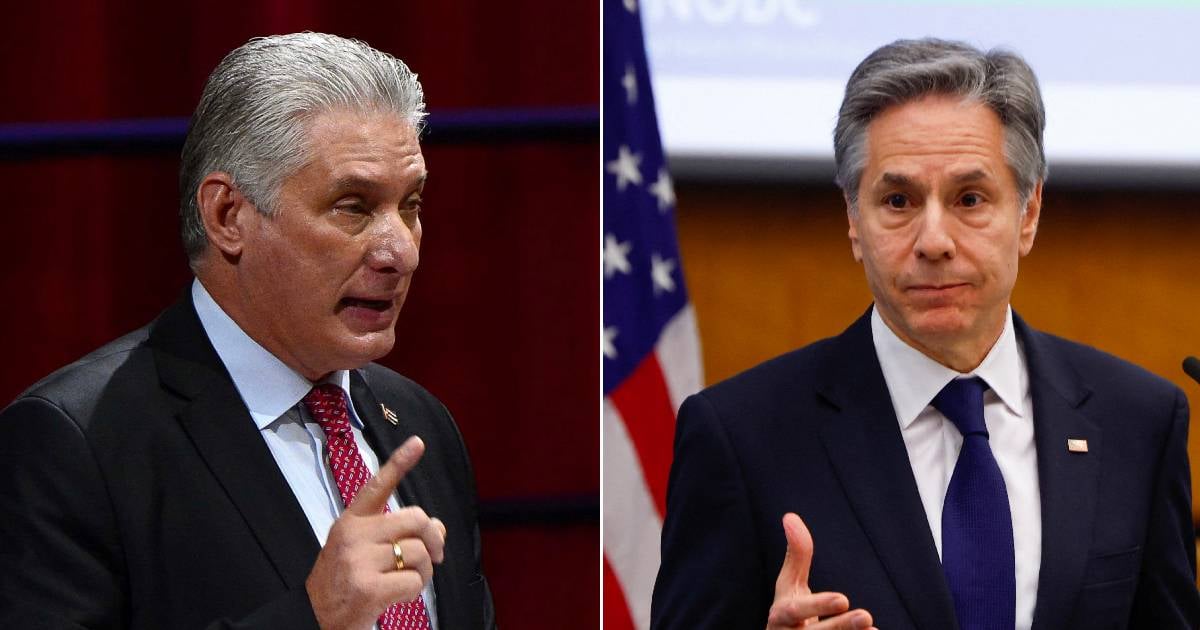
The ruler Miguel Díaz-Canel responded to Secretary of State Antony Blinken for keeping the island at its highest level of alert in the Trafficking in Persons Report, stating that it is a "maneuver in the open war against Cuban medical collaboration."
"The empire has once again listed #Cuba in its manipulative Human Trafficking Report. Outrageous maneuver in the open war against Cuban medical collaboration. Enough of the cynicism, @SecBlinken. You are well aware of our #ZeroTolerance policy towards this criminal practice," said in a message shared on social media.
The Cuban president, in his statement, accused the United States of using the report in a manipulative way and as part of an open war campaign against Cuba's medical collaboration, an initiative that Havana defends as a humanitarian effort.
The regime insists that sending doctors to other countries is part of a "medical collaboration" as if such service were free; although it is known that Havana charges huge sums for these missions and pays doctors only a small percentage of the profits.
The State Department report, published this Tuesday, confirmed that Cuba will remain at Level 3, the highest, for not meeting the minimum standards for the elimination of human trafficking.
This rating indicates that the Cuban government is not only failing to make significant efforts to address the issue, but also continues to engage in governmental practices that enable and benefit from forced labor.
Although the Cuban government approved the National Action Plan (NAP) 2023-2026 to combat human trafficking, the measures taken so far have been considered insufficient in the face of accusations that the country benefits from forced labor, especially through the export of labor program, including medical missions abroad, which have been the subject of controversy.
The report reveals that the Cuban government continues to deploy workers abroad under coercive and deceptive conditions.
Often, these workers, many of them healthcare professionals, have their passports and professional credentials confiscated, are subjected to strict curfews and surveillance, and receive salaries well below what was promised.
The government withholds a significant portion of their salaries and does not adequately inform them about the terms of their contracts, which vary from one country to another.
In addition, the authorities threaten and punish workers and their families if they try to leave the program. These practices have been widely documented by victims, NGOs, international organizations, and foreign governments, who accuse Cuban officials of facilitating serious human rights abuses and forced labor.
One of the most concerning aspects is that the Cuban government continues to send its citizens to work in exploitative conditions in countries in Africa, Asia, Latin America, and the Caribbean, among others; while evading requests to clarify the situation before international rapporteurs who have asked for an explanation about these medical missions.
In many of these destinations, Cuban workers are used in programs that border on modern slavery. These programs are presented as solidarity missions, but in reality, they are mechanisms of labor exploitation that generate significant income for the Cuban government, as highlighted in the Report.
The Cuban government has shown a significant decrease in efforts to process and prosecute trafficking crimes. According to the most recent official data, only six victims of sexual trafficking were identified in 2022, the lowest number in a decade. Additionally, there were no reports of any investigations, prosecutions, or convictions for labor trafficking.
Article 363.1 of the Cuban Penal Code penalizes labor trafficking and some forms of sexual trafficking, with sentences ranging from seven to 15 years in prison. However, the law does not include clear provisions for cases of child sexual trafficking, which hinders the effective protection of these minors.
Despite the seriousness of these accusations, the Cuban authorities have not made sufficient efforts to investigate or prosecute those responsible for these crimes.
In many cases, government officials themselves are involved in trafficking networks, creating an environment of impunity that further complicates the fight against these practices. According to the State Department's report, the authorities' complicity not only enables labor and sexual exploitation but also discourages victims from reporting abuses out of fear of reprisals.
What do you think?
COMMENTFiled under: